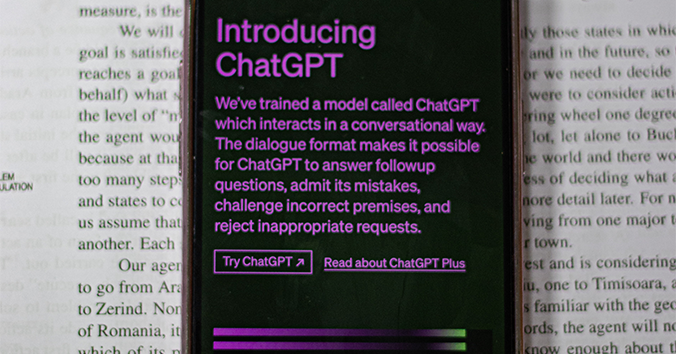AI tools can both transform and produce content such as texts, images and music. The tools are also increasingly available as online services. One example is the ChatGPT tool, which you can ask questions and get well-informed, logically reasoned answers from. Answers that the tool can correct if you point out errors and ambiguities. You can interact with the tool almost as if you were conversing with a human.
Such a tool can of course be very useful. It can help you solve problems and find relevant information. I venture to guess that the response from the tool can also stimulate creativity and open the mind to unexpected possibilities, just as conversations with people tend to do. However, like all technology, these tools can also be abused and students have already used ChatGPT to complete their assignments.
The challenge in education and research is thus to learn to use these AI tools with academic integrity. Using AI tools is not automatically cheating. Seven participants in a European network for academic integrity (ENAI), including Sonja Bjelobaba at CRB, write about the challenge in an editorial in International Journal for Educational Integrity. Above all, the authors summarize tentative recommendations from ENAI on the ethical use of AI in academia.
An overarching aim in the recommendations is to integrate recommendations on AI with other related recommendations on academic integrity. Thus, all persons, sources and tools that influenced ideas or generated content must be clearly acknowledged – including the use of AI tools. Appropriate use of tools that affect the form of the text (such as proofreading tools, spelling checkers and thesaurus) are generally acceptable. Furthermore, an AI tool cannot be listed as a co-author in a publication, as the tool cannot take responsibility for the content.
The recommendations also emphasize the importance of educational efforts on the ethical use of AI tools. Read the recommendations in their entirety here: ENAI Recommendations on the ethical use of Artificial Intelligence in Education.

Written by…
Pär Segerdahl, Associate Professor at the Centre for Research Ethics & Bioethics and editor of the Ethics Blog.
Foltynek, T., Bjelobaba, S., Glendinning, I. et al. ENAI Recommendations on the ethical use of Artificial Intelligence in Education. International Journal for Educational Integrity 19, 12 (2023). https://doi.org/10.1007/s40979-023-00133-4
We care about education



0 Comments
1 Pingback